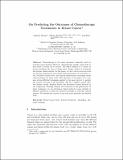Files in this item
On predicting the outcomes of chemotherapy treatments in Breast cancer
Item metadata
| dc.contributor.author | Silvina, Agastya | |
| dc.contributor.author | Kuster Filipe Bowles, Juliana | |
| dc.contributor.author | Hall, Peter | |
| dc.contributor.editor | Riaño, David | |
| dc.contributor.editor | Wilk, Szymon | |
| dc.contributor.editor | ten Teije, Annette | |
| dc.date.accessioned | 2019-06-21T10:30:01Z | |
| dc.date.available | 2019-06-21T10:30:01Z | |
| dc.date.issued | 2019 | |
| dc.identifier | 258191887 | |
| dc.identifier | 66f93970-0c43-4c29-9ef9-c51077e6a191 | |
| dc.identifier | 85068330300 | |
| dc.identifier | 000495606500024 | |
| dc.identifier.citation | Silvina , A , Kuster Filipe Bowles , J & Hall , P 2019 , On predicting the outcomes of chemotherapy treatments in Breast cancer . in D Riaño , S Wilk & A ten Teije (eds) , Artificial Intelligence in Medicine : 17th Conference on Artificial Intelligence in Medicine, AIME 2019, Poznan, Poland, June 26–29, 2019, Proceedings . Lecture Notes in Computer Science (including subseries Lecture Notes in Artificial Intelligence and Lecture Notes in Bioinformatics) , vol. 11526 LNAI , Springer , pp. 180-190 , AIME 2019 17th Conference on Artificial Intelligence in Medicine , Poznan , Poland , 26/06/19 . https://doi.org/10.1007/978-3-030-21642-9_24 | en |
| dc.identifier.citation | conference | en |
| dc.identifier.isbn | 9783030216412 | |
| dc.identifier.isbn | 9783030216429 | |
| dc.identifier.issn | 0302-9743 | |
| dc.identifier.other | ORCID: /0000-0002-5918-9114/work/58755454 | |
| dc.identifier.uri | https://hdl.handle.net/10023/17940 | |
| dc.description.abstract | Chemotherapy is the main treatment commonly used for treating cancer patients. However, chemotherapy usually causes side effects some of which can be severe. The effects depend on a variety of factors including the type of drugs used, dosage, length of treatment and patient characteristics. In this paper, we use a data extraction from an oncology department in Scotland with information on treatment cycles, recorded toxicity level, and various observations concerning breast cancer patients for three years. The objective of our paper is to compare several different techniques applied to the same data set to predict the toxicity outcome of the treatment. We use a Markov model, Hidden Markov model, Random Forest and Recurrent Neural Network in our comparison. Through analysis and evaluation of the performance of these techniques, we can determine which method is more suitable in different situations to assist the medical oncologist in real-time clinical practice. We discuss the context of our work more generally and further work. | |
| dc.format.extent | 11 | |
| dc.format.extent | 342235 | |
| dc.language.iso | eng | |
| dc.publisher | Springer | |
| dc.relation.ispartof | Artificial Intelligence in Medicine | en |
| dc.relation.ispartofseries | Lecture Notes in Computer Science (including subseries Lecture Notes in Artificial Intelligence and Lecture Notes in Bioinformatics) | en |
| dc.subject | Breast cancer data | en |
| dc.subject | Toxicity prediction | en |
| dc.subject | Modelling | en |
| dc.subject | Machine learning | en |
| dc.subject | QA75 Electronic computers. Computer science | en |
| dc.subject | RC0254 Neoplasms. Tumors. Oncology (including Cancer) | en |
| dc.subject | RM Therapeutics. Pharmacology | en |
| dc.subject | Computer Science(all) | en |
| dc.subject | Theoretical Computer Science | en |
| dc.subject | NDAS | en |
| dc.subject | SDG 3 - Good Health and Well-being | en |
| dc.subject.lcc | QA75 | en |
| dc.subject.lcc | RC0254 | en |
| dc.subject.lcc | RM | en |
| dc.title | On predicting the outcomes of chemotherapy treatments in Breast cancer | en |
| dc.type | Conference item | en |
| dc.contributor.sponsor | European Commission | en |
| dc.contributor.institution | University of St Andrews. School of Computer Science | en |
| dc.identifier.doi | https://doi.org/10.1007/978-3-030-21642-9_24 | |
| dc.identifier.grantnumber | SEP-210512424 | en |
This item appears in the following Collection(s)
Items in the St Andrews Research Repository are protected by copyright, with all rights reserved, unless otherwise indicated.

